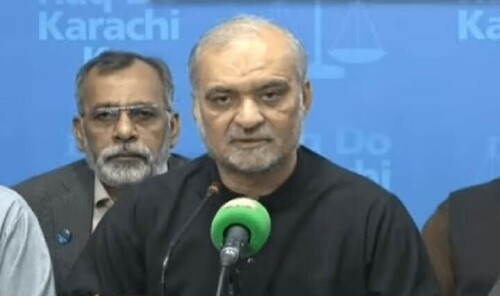
KARACHI: An interesting session on ‘Socially motivated content in South Asian films’ moderated by Rashid Sami on the third day of the inaugural Pakistan International Film Festival (PIFF) at Ziauddin University on Saturday had the audience’s undivided attention.
Indian film-maker and music composer Vishal Bhardwaj said civil society does not put pressure on the Indian film industry because it is easier to make films in India. No film gets banned in the country; even if the censor board puts a ban on a film, the film-maker can go to a court of law. This happened in the case of Shekhar Kapur’s Bandit Queen which became victim of a scandal but was later cleared for screening by the Supreme Court. The same happened with Urta Punjab. The judiciary in India is evolved. If the censor board shows narrow-mindedness, there is recourse available to film-makers to go to a court of law. Funding is difficult and one has to act like a con artist to sell an idea to a producer.
Film-maker Subhash Kapoor (the director of the critically acclaimed and commercially successful Jolly LLB) said having a journalistic background helped him in his film-making because being a journalist enabled him to understand issues related to Indian society. The first film he made was Say Salam India (2007) which was about four schoolboys who take on boys belonging to affluent backgrounds. He himself bought the highest number of DVDs of the film and whenever a producer wanted to know what he’s done in showbiz, he would give him a DVD copy of the movie.
It is impossible to make a film for two billion people, says Jami
Kapoor remarked there were three kinds of films: one which touches you emotionally, the other uplifts you and the last one is the kind of film that whispers in your ear: ‘you can also make a film’. And that film for him was Jaane Bhi Do Yaaro directed by Kundan Shah. He emphasised that one should make a film on a subject that one has experienced.
Film producer Momina Duraid said when she set out to make a film (after being a TV producer for a considerable time) she had [the works of] Shoaib Mansoor in mind. The important thing about her first movie Bin Roye was that it was simultaneously released in Pakistan and the rest of the world. She added that unless a film has commercial value, it will not be accepted [by the audience] and it is a challenge to have a message in such a venture.
Actress and producer Hareem Farooq said we need to have commercial cinema and at the same time address serious issues.
Film-maker Jami said we still don’t have a film industry in Pakistan. We need issue-based cinema. Agreeing with a previous speaker about having fewer screens in Pakistan, he argued that with 120 screens, you cannot expect to make commercial films.
Replying to another question Jami said he does not make films for others; he makes films for himself because it is impossible to make a film for two billion people. You have to come up with your own genre. With regard to the subject of his film Moor, he told the moderator that there are many takleef deh issues in Balochistan, he picked just one of them.
Indian film-maker Nishtha Jain, the director of the award-winning documentary Gulabi Gang, said she is proud to be a feminist. Till not too long ago, rape wasn’t considered a crime in France. So feminists have had a long struggle. She pointed out that she makes movies on subjects that she comes across in her daily life.
Published in Dawn, April 1st, 2018












































Dear visitor, the comments section is undergoing an overhaul and will return soon.